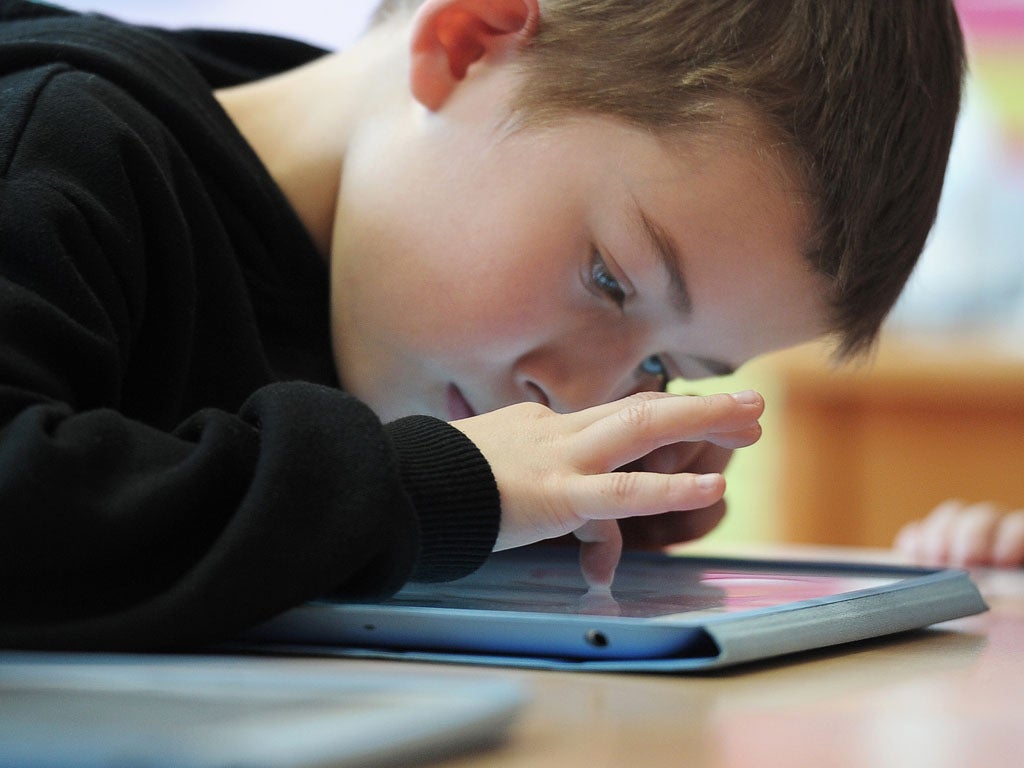iPad make childs inartikulates? Take some time away from technology with them
A new study shows that children’s ability to learn new vocabulary is being limited by text messages, emails and online entertainment


Waiting for a train to work the other day, I watched a mother and her two young sons navigate the platform.
One boy, a toddler, was in his pushchair, the other, aged about six, was wheeling his scooter. The little group came to a stop not far from me. In the few minutes that followed, rather than enjoying a moment’s peace in the sunshine before our journey into the city, we all filled the time with the impatient distraction activity so familiar in the 21st century. I scrolled through emails on my BlackBerry. The mother took out her mobile phone and made a call. Her younger son kicked his legs back and forth in his seat, while her elder child echoed the pattern, pushing his scooter with one foot so that it swung like a pendulum. Other commuters fiddled with their iPhones.
Suddenly there was a scream. I looked up from my BlackBerry to see the mother rushing to the platform edge. The train was only two minutes away. Scanning the scene in horror, I then saw that both boys remained on the platform. The six-year-old had let his scooter go, and, thankfully, it was only this that was lying on the tracks. A fellow commuter (with quicker wits than me) ran to the ticket office to put a call in to the oncoming train, while another went to the far end of the platform to alert the driver, who slowed down in time and, eventually, rescued the scooter for the tearful boy.
As a parent whose own child is learning to ride a scooter, I initially felt nothing but sympathy for this mother. As we all boarded the train, I offered to carry her bag, and asked if she was ok. But then I thought, with a benefit-of-hindsight inward tut-tutting that middle class mummies do best, should you have been on your phone while your son played with his scooter on a railway platform?
I am, undoubtedly, a hypocrite. While I am extremely vigilant to the point of over-protective when my daughter goes on her scooter, there are other times when I let the tyranny of mobile phones and computers seep into our everyday life. I am on Twitter while she watches old episodes of the Tweenies on YouTube. I was alarmed to find that she has worked out how to play a new episode if I’m not looking. She has started saying the phrase “Facebook page” – which is odd because I’m hardly ever on there, but so pervasive is social media that she has picked up the words by osmosis. My daughter, at three, is more aware of the problem than I am. She will tell me, “Put your phone away, Mummy” when I am cradling my BlackBerry instead of helping her draw a picture.
I know a woman who has banned her three-year-old son from watching any TV, ever, which is a little extreme, particularly when CBeebies, in small amounts, is entertaining my child while her parents are rushing around getting ready for work. But there is now completely unsurprising evidence that young children’s speech and learning are being held back by the dominance of iPads, computers and mobile phones.
A study by Marco Catani, of the Institute of Psychiatry, King’s College London, has found that children’s ability to learn new vocabulary is being limited by text messages, emails and online entertainment, and that there is no substitute for listening to the voice of a parent or teacher. Listening to a real human speaking helps young brains learn novel words, while those who spend their time staring at a screen are held back in speech, the study found. This seems so obvious that you have to wonder why we parents are not ditching our technology to talk to our children all the time.
Nick Clegg revealed earlier this month that he has banned phones and iPads at the dinner table so his wife and sons have dedicated family time. The Deputy Prime Minister’s words almost go without saying, until you realise that you’re reading them on an iPhone while ignoring your child at breakfast.
Inevitably, there is a “tablet for toddlers” device, made by Leap Frog, called a “Tag Reader”, which looks like a souped-up pen that a child can use to learn how to read. The youngster uses the Tag Reader (RRP: £22) to scan words on the page of a specially-designed book to hear how the word sounds. Leap Frog, which seems to have a tie-in with Disney, given that all of its books are based on its characters, promises that “learning becomes a magical journey with Tag touch technology”. I tell you what would be more magical – and can save you £22 – is simply buying an ordinary children’s book off the shelf and reading it to your child. No need for a special pen, when your finger can point to the words and your voice can say it aloud.
Sometimes we are so tired at the end of the day that it is easier to subcontract our parenting to an iPad than muster up the effort to entertain our children with a jigsaw or a sticker book. We justify our behaviour by telling ourselves that there are plenty of educational activities online (although I’m not sure the Tweenies or Peppa Pig fall into this category). But it takes a study like this, or an upsetting incident on a railway platform, to realise that our lives have succumbed to digital creep.
Join our commenting forum
Join thought-provoking conversations, follow other Independent readers and see their replies
Comments
Bookmark popover
Removed from bookmarks